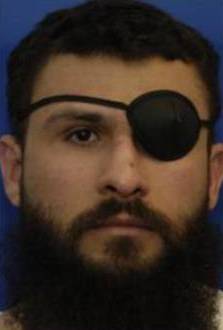
Abu Zubaydah is a Palestinian citizen and alleged terrorist born in Saudi Arabia currently held by the U.S. in the Guantanamo Bay detention camp in Cuba. He is held under the authority of Authorization for Use of Military Force Against Terrorists (AUMF).

During the early stages of the Iraq War, members of the United States Army and the Central Intelligence Agency committed a series of human rights violations and war crimes against detainees in the Abu Ghraib prison in Iraq, including physical abuse, sexual humiliation, both physical and psychological torture, rape, as well the killing of Manadel al-Jamadi and the desecration of his body. The abuses came to public attention with the publication of photographs of the abuse by CBS News in April 2004. The incidents caused shock and outrage, receiving widespread condemnation within the United States and internationally.

Mohammed Mani Ahmad al-Qahtani is a Saudi citizen who was detained as an al-Qaeda operative for 20 years in the United States's Guantanamo Bay detention camps in Cuba. Qahtani allegedly tried to enter the United States to take part in the September 11 attacks as the 20th hijacker and was due to be onboard United Airlines Flight 93 along with the four other hijackers. He was refused entry due to suspicions that he was trying to illegally immigrate. He was later captured in Afghanistan in the battle of Tora Bora in December 2001.

The Salt Pit and Cobalt were the code names of an isolated clandestine CIA black site prison and interrogation center outside Bagram Air Base in Afghanistan. It was located north of Kabul and was the location of a brick factory prior to the Afghanistan War. The CIA adapted it for extrajudicial detention.
The five techniques, also known as deep interrogation, are a group of interrogation methods developed by the United Kingdom during the 20th century and are currently regarded as a form of torture. Originally developed by British forces in a variety of 20th-century conflicts, they are most notable for being applied to detainees in Northern Ireland during the Troubles. The five collective methods are prolonged wall-standing, hooding, subjection to noise, deprivation of sleep, and deprivation of food and drink.

Binyam Ahmed Mohamed, also referred to as Benjamin Mohammed, Benyam Mohammed or Benyam Mohammed al-Habashi, is an Ethiopian national and United Kingdom resident, who was detained as a suspected enemy combatant by the US Government in Guantanamo Bay prison between 2004 and 2009 without charges. He was arrested in Pakistan and transported first to Morocco under the US's extraordinary rendition program, where he claimed to have been interrogated under torture.
Fouad Mahmoud al Rabiah is a Kuwaiti, who was held in the United States Guantanamo Bay detainment camps, in Cuba from May 2002 to December 2009. Al Rabia's Guantanamo Internment Serial Number was 551.
Extrajudicial prisoners of the United States, in the context of the early twenty-first century War on Terrorism, refers to foreign nationals the United States detains outside of the legal process required within United States legal jurisdiction. In this context, the U.S. government is maintaining torture centers, called black sites, operated by both known and secret intelligence agencies. Such black sites were later confirmed by reports from journalists, investigations, and from men who had been imprisoned and tortured there, and later released after being tortured until the CIA was comfortable they had done nothing wrong, and had nothing to hide.
Ghassan Abdallah Ghazi al-Sharbi is a Saudi citizen who was held in extrajudicial detention in the United States Guantanamo Bay detention camps, in Cuba. His Guantanamo Internment Serial Number was 682.

Mohammed Farik Bin Amin, alias Zubair Zaid, is a Malaysian who is alleged to be a senior member of Jemaah Islamiyah and al Qaeda. He is currently in American custody in the Guantanamo Bay detention camp. He is one of the 14 detainees who had previously been held for years at CIA black sites. He is currently awaiting trial in a military commission. In the ODNI biographies of those 14, Amin is described as a direct subordinate of Hambali. Farik Amin is also a cousin of well-known Malaysian terrorist Zulkifli Abdhir.
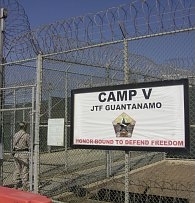
The Guantanamo Bay detention camp is a United States military prison within the Guantanamo Bay Naval Base, also referred to as Gitmo, on the coast of Guantánamo Bay in Cuba. As of March 2022, of the 780 people detained there since January 2002 when the military prison first opened after the September 11 attacks, 741 had been transferred elsewhere, 30 remained there, and 9 had died while in custody.

Mohamed Jawad, was accused of attempted murder before a Guantanamo military commission on charges that he threw a grenade at a passing American convoy on December 17, 2002. Jawad's family says that he was 12 years old at the time of his detention in 2002. The United States Department of Defense maintains that a bone scan showed he was about 17 when taken into custody.
The United States Department of Defense (DOD) had stopped reporting Guantanamo suicide attempts in 2002. In mid-2002 the DoD changed the way they classified suicide attempts, and enumerated them under other acts of "self-injurious behavior".
"Enhanced interrogation techniques" or "enhanced interrogation" was a program of systematic torture of detainees by the Central Intelligence Agency (CIA), the Defense Intelligence Agency (DIA) and various components of the U.S. Armed Forces at remote sites around the world—including Bagram, Guantanamo Bay, Abu Ghraib, and Bucharest—authorized by officials of the George W. Bush administration. Methods used included beating, binding in contorted stress positions, hooding, subjection to deafening noise, sleep disruption, sleep deprivation to the point of hallucination, deprivation of food, drink, and medical care for wounds, as well as waterboarding, walling, sexual humiliation, rape, sexual assault, subjection to extreme heat or extreme cold, and confinement in small coffin-like boxes. A Guantanamo inmate's drawings of some of these tortures, to which he himself was subjected, were published in The New York Times. Some of these techniques fall under the category known as "white room torture". Several detainees endured medically unnecessary "rectal rehydration", "rectal fluid resuscitation", and "rectal feeding". In addition to brutalizing detainees, there were threats to their families such as threats to harm children, and threats to sexually abuse or to cut the throat of detainees' mothers.

The Behavioral Science Consultation Teams are groups of psychiatrists, other medical doctors and psychologists who study detainees in American extrajudicial detention.
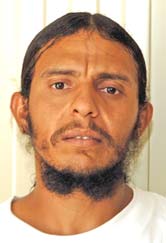
Tolfiq Nassar Ahmed Al Bihani is a citizen of Saudi Arabia held in the United States's Guantanamo Bay detention camps, in Cuba. His Guantanamo Internment Serial Number is 893.
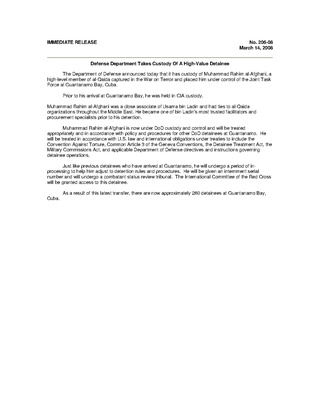
Muhammad Rahim is an Afghan who is held in captivity by the United States Government at Guantanamo Bay. He was born in eastern Afghanistan. Muhammad Rahim worked for an Afghan government committee that worked to eliminate opium poppies from the nation. He was forced to leave his job by the Taliban. In 1979, Rahim fled Afghanistan with his brother over the border of Pakistan. Their departure was triggered by the Soviet Union invasion into Afghanistan.
James Elmer Mitchell is an American psychologist and former member of the United States Air Force. From 2002, after his retirement from the military, to 2009, his company Mitchell Jessen and Associates received $81 million on contract from the CIA to carry out the torture of detainees, referred to as "enhanced interrogation techniques" that resulted in little credible information.

Separate facilities exist to provide for Guantanamo detainees' medical care.
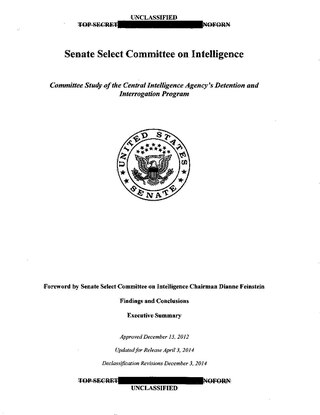
The Committee Study of the Central Intelligence Agency's Detention and Interrogation Program is a report compiled by the bipartisan United States Senate Select Committee on Intelligence (SSCI) about the Central Intelligence Agency (CIA)'s Detention and Interrogation Program and its use of torture during interrogation in U.S. government communiqués on detainees in CIA custody. The report covers CIA activities before, during, and after the "War on Terror". The initial report was approved on December 13, 2012, by a vote of 9–6, with seven Democrats, one Independent, and one Republican voting in favor of the report and six Republicans voting in opposition.











